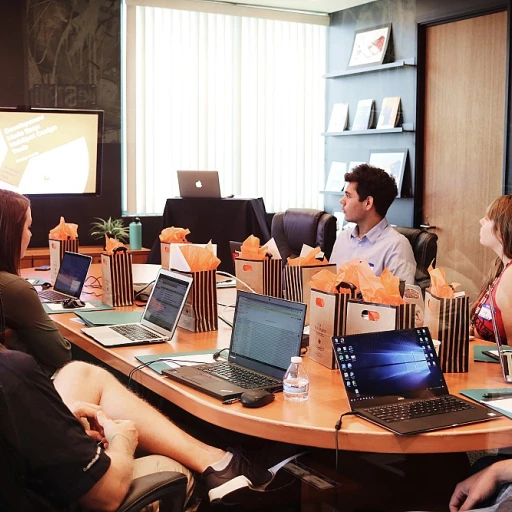
The Role of New Hires in Company Growth
The Influence of New Hires on Business Development
In today's dynamic business environment, the role of new hires in the growth of companies in the Arabian Emirates cannot be overstated. Newly hired employees play a critical part in enriching a company's culture, enhancing productivity, and driving innovation. Once the onboarding process is handled effectively, new employees can help stimulate the workforce by infusing fresh ideas and new perspectives into existing strategies. The onboarding experience is pivotal in preparing hires for their roles and ensuring their seamless integration into the team. Effective onboarding, including comprehensive training and clear communication of expectations, lays the groundwork for long-term employee engagement. This process must be meticulously managed to ensure hires are not only well-equipped for their roles from day one but are also enthusiastic about contributing to the company’s objectives. Office managers often oversee the onboarding and hire reporting processes. Ensuring an efficient and organized onboarding framework is paramount for harnessing the potential of new hires. For instance, pre boarding and employee orientation sessions can significantly reduce confusion and foster confidence in newly hired professionals, contributing to a productive start. Furthermore, understanding the long-term impact of new hires goes beyond the initial days of training and orientation. Tracking hire reports and analyzing hire onboarding performance metrics is crucial for measuring success. Such strategies not only outline the areas of improvement but also highlight the best practices and successful integration techniques that can be replicated in future hiring processes. For deeper insights into effective HR strategies and their influence on employee engagement, explore enhancing employee engagement.Challenges Faced by Office Managers
Barriers Encountered by Office Management
Office managers in Arabian Emirate companies often face a unique set of challenges when it comes to hiring and onboarding new employees. From managing employee onboarding and training to ensuring a positive onboarding experience, the process requires significant attention to detail and a thoughtful approach.
One key challenge is coordinating the onboarding process, which involves various aspects such as pre boarding arrangements, coordinating training sessions, and managing hire reporting. Ensuring new hires are equipped with the necessary resources, like health insurance and understanding their employment terms, including employee engagement, are crucial elements.
Office managers must also ensure a seamless employee orientation, facilitating a smooth transition for the newly hired into their roles. This includes setting clear job expectations and helping integrate them into the team culture. Ensuring that the hired employee has access to the right tools and resources from day one can significantly influence their success.
Furthermore, managing these processes requires effective management practices to address the logistics of onboarding while maintaining clear communication channels. Facilitating this transition can be demanding, especially when hiring in large volumes. It is imperative to keep a comprehensive hire report for tracking the progress and performance of hired employees to optimize long-term success.
Enhancing the capabilities of the HR team may greatly assist in overcoming these challenges, enabling a more efficient hiring process. By addressing common difficulties, office managers can streamline operations, improve employee satisfaction from the beginning, and foster a productive workspace.
Cultural Adaptation and Integration
Embracing Cultural Diversity in the Workplace
Integrating newly hired employees into Arabian Emirate companies involves more than just familiarizing them with their daily job tasks. One of the most important aspects of the onboarding process is helping hires adapt to the company culture, which often includes a diverse range of cultural backgrounds. This adaptation is crucial in fostering long-term employee engagement and ensuring that new team members can work effectively within their new environment. When a company brings new hires on board, it is essential to understand that each individual may have unique cultural expectations and experiences. An effective hire onboarding process should consider integrating these diverse perspectives to enrich the workplace culture and promote a more inclusive atmosphere. Office managers play a pivotal role in this cultural integration process. They need to bridge any cultural gaps by introducing newcomers to company values and outlining their roles in achieving organizational goals. To help foster this understanding, organizations may implement comprehensive employee orientation programs that cover both job-specific training and cultural awareness. Resources such as Optimizing Financial Oversight in Arabian Emirate Companies can offer valuable insights into aligning company practices with cultural diversity. Offering support through cultural training and development programs is not merely about providing information; it's about fostering a sense of belonging among newly hired employees. The company can further enhance this integration by facilitating initiatives such as mentorship programs and cross-cultural team activities. These strategies aim to create an inclusive work environment where all employees feel valued and motivated to contribute their best efforts. Ultimately, successful cultural adaptation and integration are achieved when the onboarding experience aligns with the expectations and values of both the hires and the company. Only then can organizations truly maximize the potential of their diverse workforce, driving growth and success in the rapidly evolving business landscape of the Arabian Emirate.Training and Development Strategies
Implementing Effective Training Programs
When a new hire joins a company in the Arabian Emirates, the onboarding process becomes a crucial phase that sets the tone for their future engagement and productivity. A well-structured training program is essential to ensure that newly hired employees are equipped with the necessary skills and knowledge to perform their jobs effectively.
Training should not be a one-time event but an ongoing process that evolves with the company’s needs. It’s important to incorporate both technical and soft skills training, as these will help employees adapt to the company culture and work environment. Office managers play a pivotal role in facilitating this process, ensuring that training sessions are not only informative but also engaging.
Leveraging Technology for Employee Onboarding
Technology can significantly enhance the employee onboarding experience. Utilizing digital platforms for training and development allows for a more flexible and personalized approach. This can include online courses, webinars, and interactive modules that employees can complete at their own pace. Such tools also allow for better tracking of progress and performance, enabling management to provide timely feedback and support.
Fostering a Supportive Environment
Beyond formal training sessions, creating a supportive environment where new hires feel comfortable asking questions and seeking help is crucial. This can be achieved by assigning mentors or buddies to guide them through their initial days, helping them understand the company’s values and expectations. A strong support system encourages open communication and helps in building a cohesive team.
Evaluating Training Effectiveness
Regularly evaluating the effectiveness of training programs is essential to ensure they meet the evolving needs of the company and its employees. This can be done through surveys, feedback sessions, and performance assessments. By analyzing hire reports and employee feedback, companies can identify areas for improvement and make necessary adjustments to their training strategies.
Incorporating these best practices in the training and development of new hires will not only enhance their onboarding experience but also contribute to the long-term success of the company.












